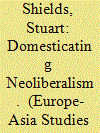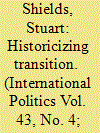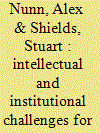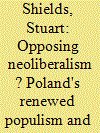| Srl | Item |
| 1 |
ID:
182498


|
|
|
|
|
| Summary/Abstract |
This essay asks whether Poland’s populism is evidence of a countermovement to European neoliberal political economy. The electoral success of PiS’s 500+ child benefit policy appears to indicate that state intervention in the form of solidarism is a legitimate response to neoliberalism. The essay argues against this. Taking domification (drawing on the Polish word for home, indicating a shift to greater social solidarism) as a starting point of analysis, it interprets 500+ as a way to co-opt particular social forces to accept the promotion of neoliberal competitiveness in Poland. What at first appears to be a progressive alternative is, in reality, a contribution to further commodification of the reach of capital enabling the reproduction of neoliberalism.
|
|
|
|
|
|
|
|
|
|
|
|
|
|
|
|
| 2 |
ID:
074961


|
|
|
| 3 |
ID:
185791


|
|
|
|
|
| Summary/Abstract |
This article asks whether there is a discrepancy between the field of International Political Economy (IPE) as we know it from recent debates about its role, distinctiveness, and contribution compared to the experience of its practitioners on the ground? Intellectually IPE is needed more than ever to engage real world events but faces constraining institutional imperatives. We have two interrelated objectives related to this: (1) to assess the extent to which the patterns in recent interventions are replicated when you ask those who self-identify as IPE scholars in the UK (2) to appraise survey data on the reproduction of a particular community of practice within the field as it evolves intellectually and institutionally. Rather than imposing our interpretation of IPE through publications, citation practices, conference attendance, or textbook content we offer two distinct contributions. First, to report new empirical data on IPE as a ‘field of inquiry’ in UK universities; and, second, to develop a critical intervention on the indisciplined nature of IPE as a field of inquiry in the UK. We conclude that the widely acknowledged and long-standing fertile intellectual advantages of IPE's ‘open range’, unlimited intellectual borders and transgressive enquiry bring institutional disadvantages with them.
|
|
|
|
|
|
|
|
|
|
|
|
|
|
|
|
| 4 |
ID:
112498


|
|
|
|
|
| Publication |
2012.
|
| Summary/Abstract |
This article interrogates the social impact of neoliberalisation and the counter-hegemonic forces this has engendered by exploring Poland's recent populist turn. It rejects methodologically nationalist attempts to isolate events in Poland from wider processes of structural change and the accompanying realignment within the global capitalist economy, analysing the implications of a number of alternative and counter-hegemonic projects to the neoliberal mainstream. The article considers whether the populist turn signals a decisive rejection of neoliberalism, despite the absence of a coherent left alternative and the fact that the anti-neoliberal alternative has come from the nationalist right, dominated by politically regressive conservative social forces who have aimed to arrest welfare cuts and end the austerity associated with Poland's seemingly endless forms of reform. While no clear anti-neoliberal strategy exists, pragmatic responses have occurred but within the structurally delimited environs of state intervention. Utilising a Gramscian critical political economy the article shows how populist counter-hegemonic forces have been co-opted and are best understood in terms of the relationship to specific conjunctural projects for the reorientation of the reproduction of capitalist social relations. The conclusion reflects on the potential for a progressive politics of a renewed Polish left to emerge.
|
|
|
|
|
|
|
|
|
|
|
|
|
|
|
|